
Emily says she’s known as the ‘weird goth girl’ who keeps to herself. And she says she has this habit -- of hitting people.
"I do just walk up, walk past my friends, and I’ll backhand them and run away laughing," said the Grant Beacon Middle School eighth grader. "I’ve actually done it to people who I don’t know that well."
She knows it’s mean. But she says that’s how things go in her family.
A schoolmate, Sorayda, 13, says she was bullied almost her entire life. It led to depression and stuffing who she really is deep inside -- just like it does for a lot of kids.
"They’re afraid of being judged, because nowadays, everybody, all they do is judge and judge and judge," she said. "They just judge without caring and they don’t even know if their judgments will hurt someone or if they’re hurting themselves."
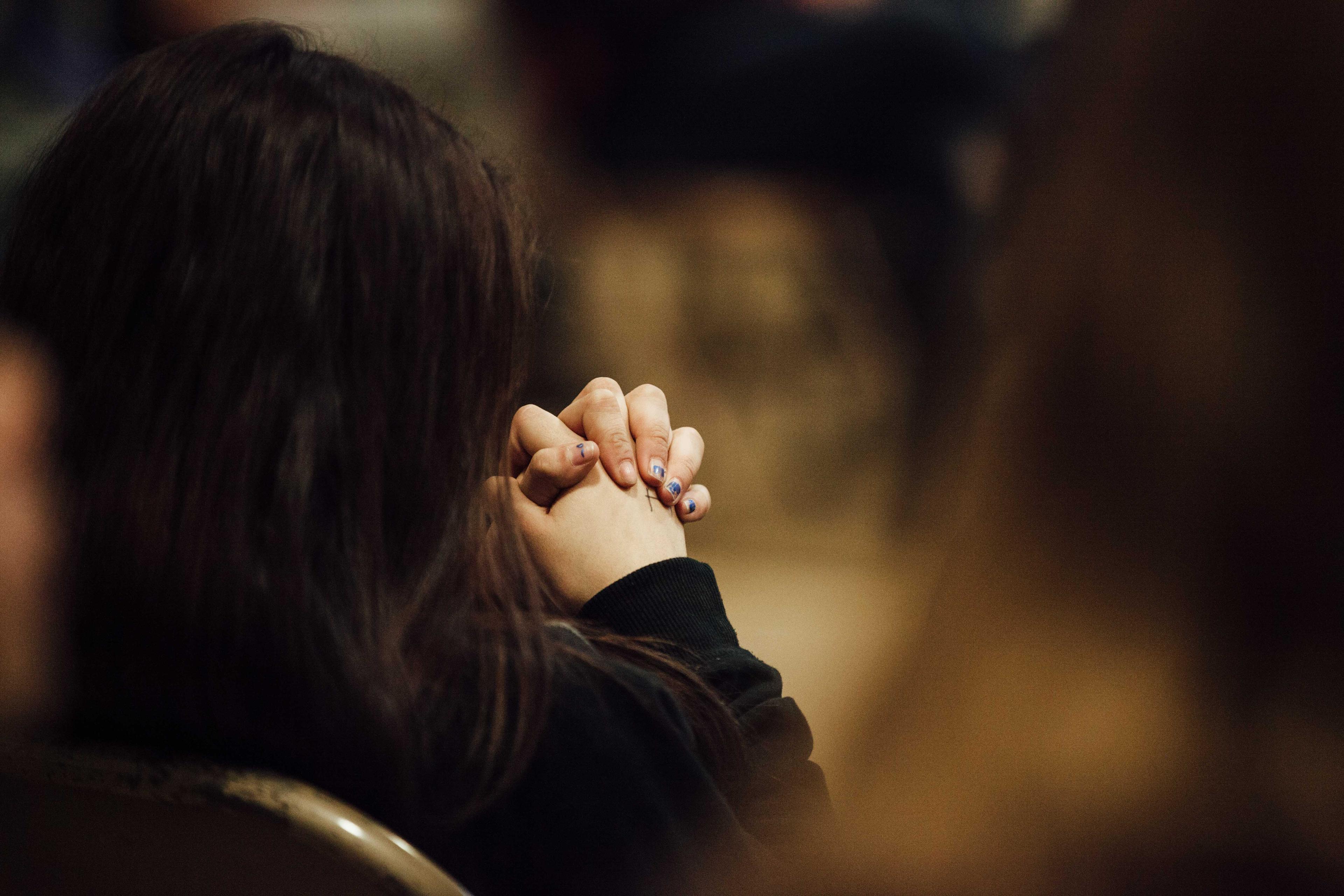
Fellow Grant Beacon eighth grader Cecilia doesn’t talk about feeling judged, but she does talk about bringing the pain she feels at home to school with her. She says she takes it out on her classmates, being disrespectful and saying mean things to friends.
"I would hurt people whose life I knew, and add on to their pain, which felt really bad, and honestly I felt guilty," she said. "And I’ve always wanted to say I’m sorry."
She doesn’t know how. Like many teenagers, she struggles with how to process emotions in a healthy way.
Pain And Sadness
Almost half of Colorado middle school students say they’ve been bullied at school, according to the most recent Colorado Healthy Kids Survey. And about a quarter of the state’s secondary students report feeling sad or hopeless.
Denver’s Grant Beacon Middle School is one of a growing number of schools trying to help kids cope with those challenges, by placing more emphasis on the social and emotional health of its students.
For eight years, it has participated in "Challenge Day," a nationwide program that’s trying to help young people deal with the many stresses they face. Jennifer Wilson, a group leader who has moderated more than a thousand Challenge Days, says there’s not a single school -- wealthy or poor -- where kids are not having emotional issues.
"They’re all on some level dealing with some sort of pain," she said. "Richer kids have a lot of anxiety and a lot of depression. And with a lot of the poor communities or inner city communities where there’s a lot of struggle, they’re dealing with their friends getting shot, they’re dealing with their parents in jail, they’re dealing with mom and dad on drugs, they’re dealing with being a foster kid and in every school I go to this is happening."
Love 'Tunnel' In The Gym
I knew I was in for an intense day recently at Grant Beacon when I walked into the gym and discovered a massive cardboard box filled with dozens of boxes of tissues.
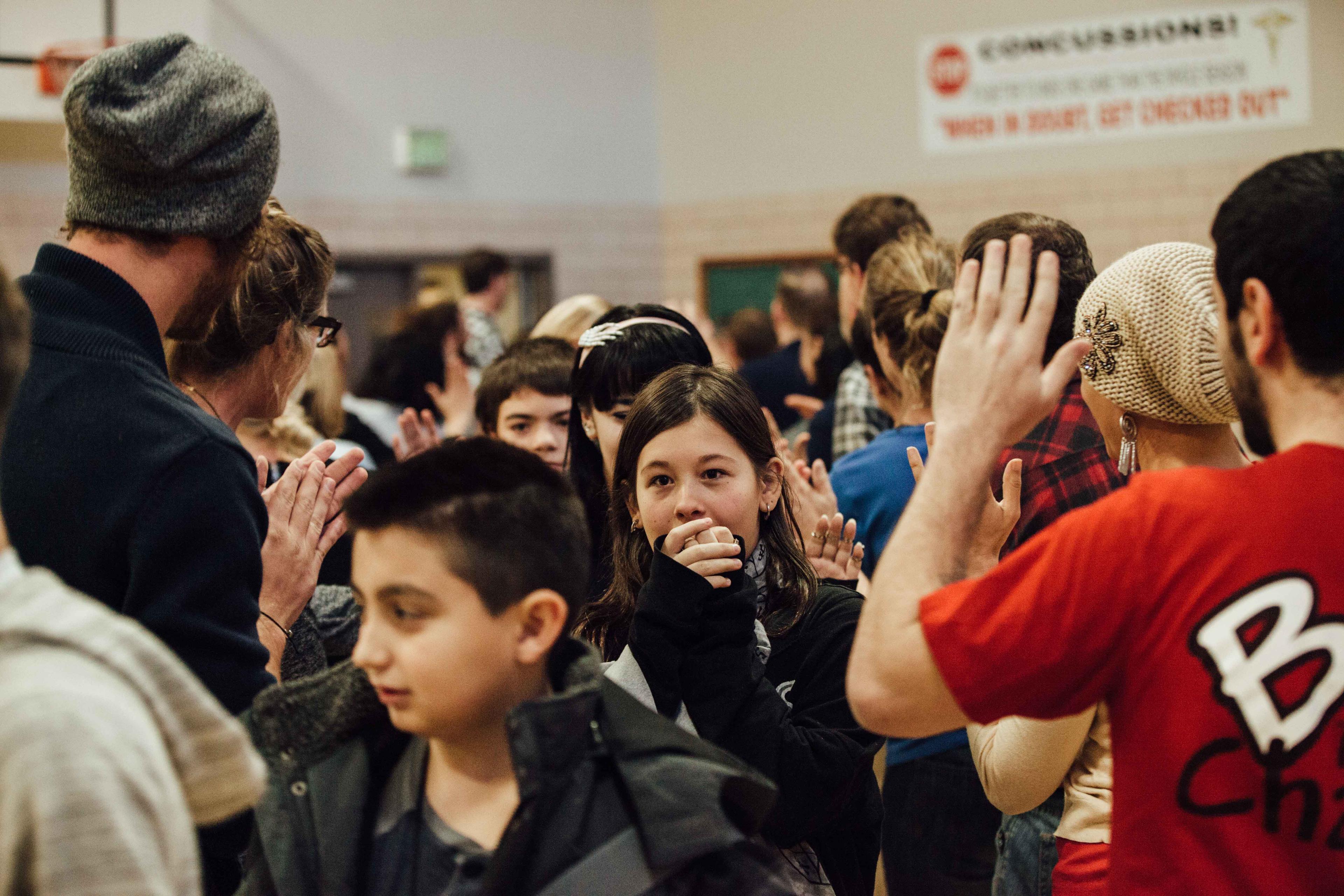
At 9 a.m. and Cecilia, Sorayda, and Emily along with about a 100 other kids, lined up and tentatively walked into the gym, which would be transformed into a safe place for them to process emotions and hopefully create a community.
The didn't start that way, though. First they had to run through a "love" tunnel of adults clapping and cheering them on.
Many of them looked wary.
"I love when they come in and there’s this hesitancy. It’s natural and they don’t know what this is. But I know where we’re taking them," said Sevan Poetry, one of the day’s leaders.
That’s to a place, he says, where over the next six hours the middle schoolers can all be vulnerable in front of each other -- when they’ll see how much they have in common.
 But first, the trick is to break down barriers. These are middle schoolers. Everybody is trying their best to fit in, look the same, and for the most part, cover up their emotions.
But first, the trick is to break down barriers. These are middle schoolers. Everybody is trying their best to fit in, look the same, and for the most part, cover up their emotions.
That creates an enormous amount of stress. And that’s where light-hearted games came in for both the adults and the kids. We stood back to back with strangers, arms linked while dancing. We ran around in a circle like horses. We were told to run up to 10 strangers and tell them, "You are amazing!" The less self-conscious and more carefree the adults were, the more the kids loosened up.
In between the short games, we did an exercise where we hugged as many people as we could -- fake bro hugs or hugs like you are burping a baby won't do -- it's real bear hugs all around. We hugged tall, skinny kids, kids that are big and soft when you hug them. Short little red-headed kids. Kids with thick glasses. Tough girls wearing all black and combat pants. They’re all trying to figure out who they are, but not stand out too much. They care intensely about what others think.
Floodgates Open, Tissues Come Out
After the fun and games, the mood shifts. In small group circles the kids were asked if they wanted to talk about what their lives are like.
That’s when the floodgates open and the tissue boxes come out.
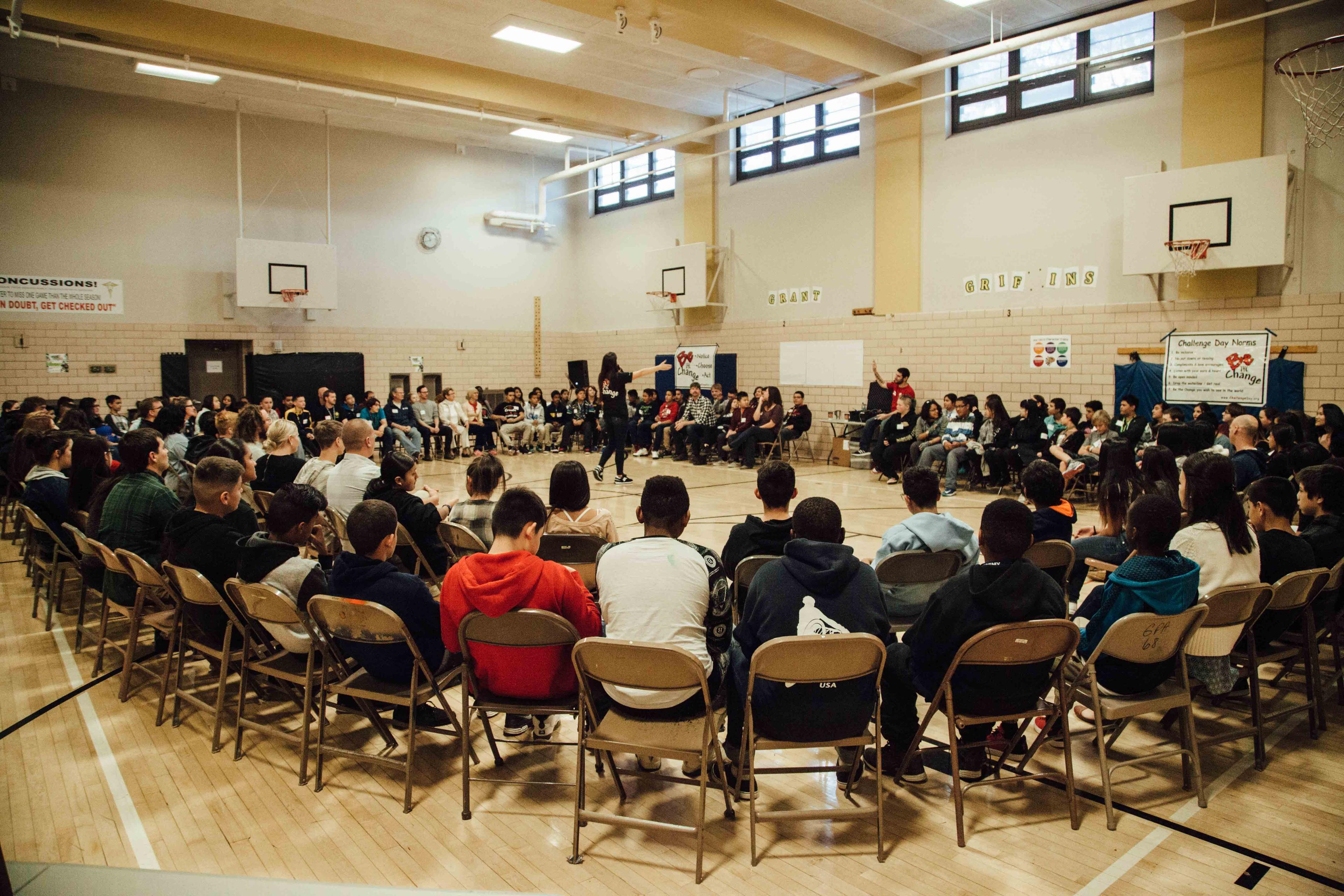
"This empathy and compassion comes out," Wilson said. "And, it’s within two hours of the day, it’s within minutes I saw them reaching out and holding each other."
Kids talked of parents who put too much pressure on them about school, about dads who shout at their moms, about getting picked on by someone at school. One kid in a Minecraft shirt spent the whole time bent over, his head in his hands -- something that's OK because the understanding is that if you don’t want to talk, you don’t have to.
"For some people, just even being in silence with their own thoughts is a new thing," leader Sevan Poetry said.
But you can listen and learn.
We sat tightly as a group, shoulder to shoulder, young and old, feeling like a big family now. We listened to the moderators talk about the unhealthy ways people numb themselves from feeling hurt -- drinking, drugs, working too much, spending too much time online. We heard about the healthy ways kids can process emotions -- sports, talking to a friend, talking to someone you trust.
Seeing Each Other As People
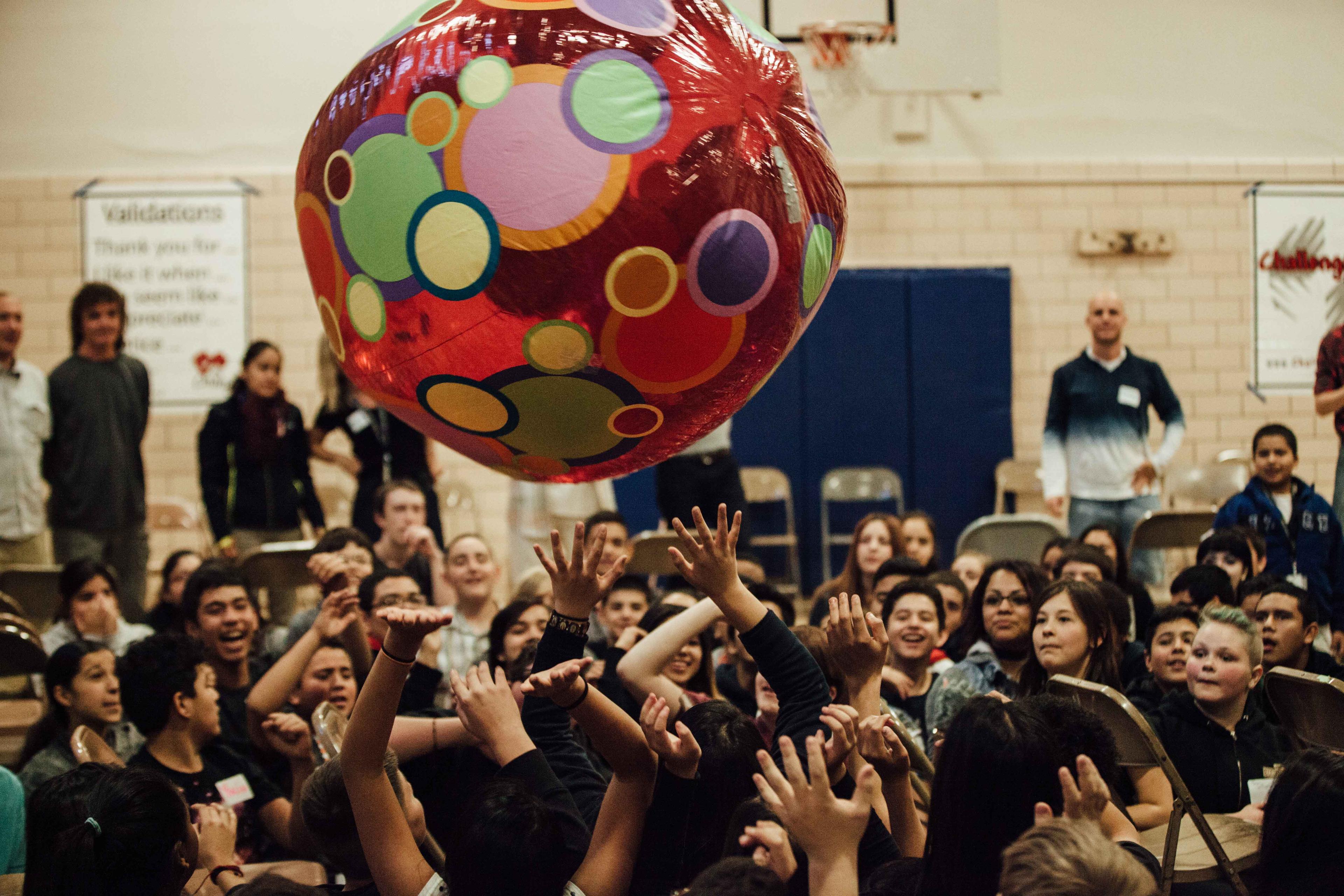
And then came a really powerful, sobering exercise, one that took a lot of courage. We all stood shoulder to shoulder behind a blue line, silent, as group leader Jennifer Wilson asked a series of questions.
"Please cross the line if you’ve ever been judged because of the color of your skin," she said.
About half the kids cross.
"And notice if you’ve seen this and you’ve done something about it, or if you join in and laugh and make jokes," Wilson asks the group that stayed behind, encouraging them to think about the actions they've taken.
The kids then all cross back.
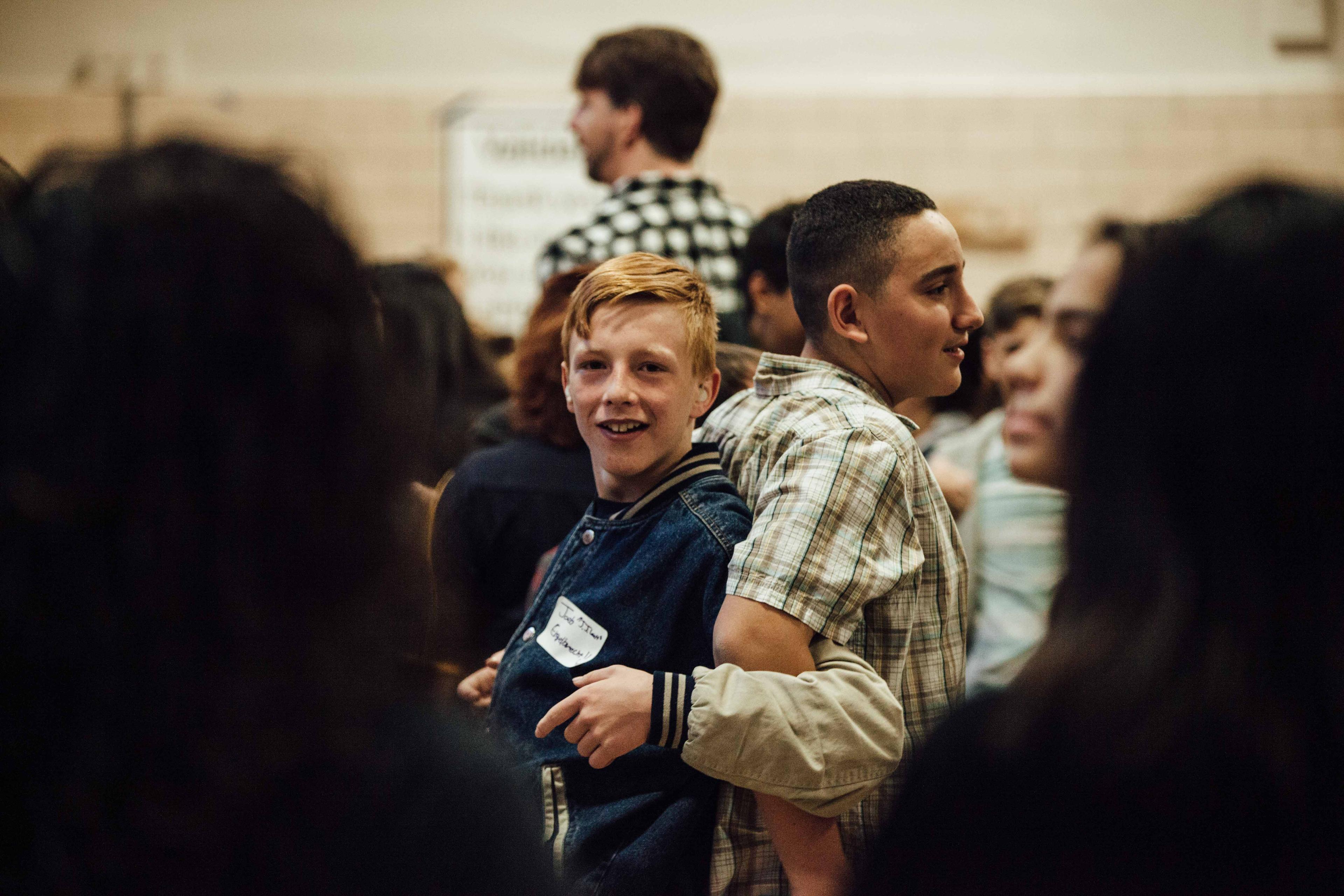
"Please cross the line if you come from a family where alcohol or other drugs have ever been a problem," said Wilson.
"If you crossed for this, I want you to notice that 80 percent of this room just crossed with you," said Wilson. "Did you know that? That that many people also knows what it’s like to be dealing with that in their family?"
Have they ever felt alone at school? Far more than half the kids cross.
Ever been hit, slapped, spanked or abused? Many more kids cross the line.
Ever lived in foster care or were homeless? About 50 kids cross the line.
With each question, the people who don’t cross the line raise their hands in a symbol for love and support, looking into the faces of those who do.
As the exercise continued, many kids were in tears. But they weren't crying alone. Kids stood in circles with their arms around each other. Adolescent boys, crying alone, find themselves embraced by boys they don’t appear to know.
Poetry says he sees this phenomenon again and again.
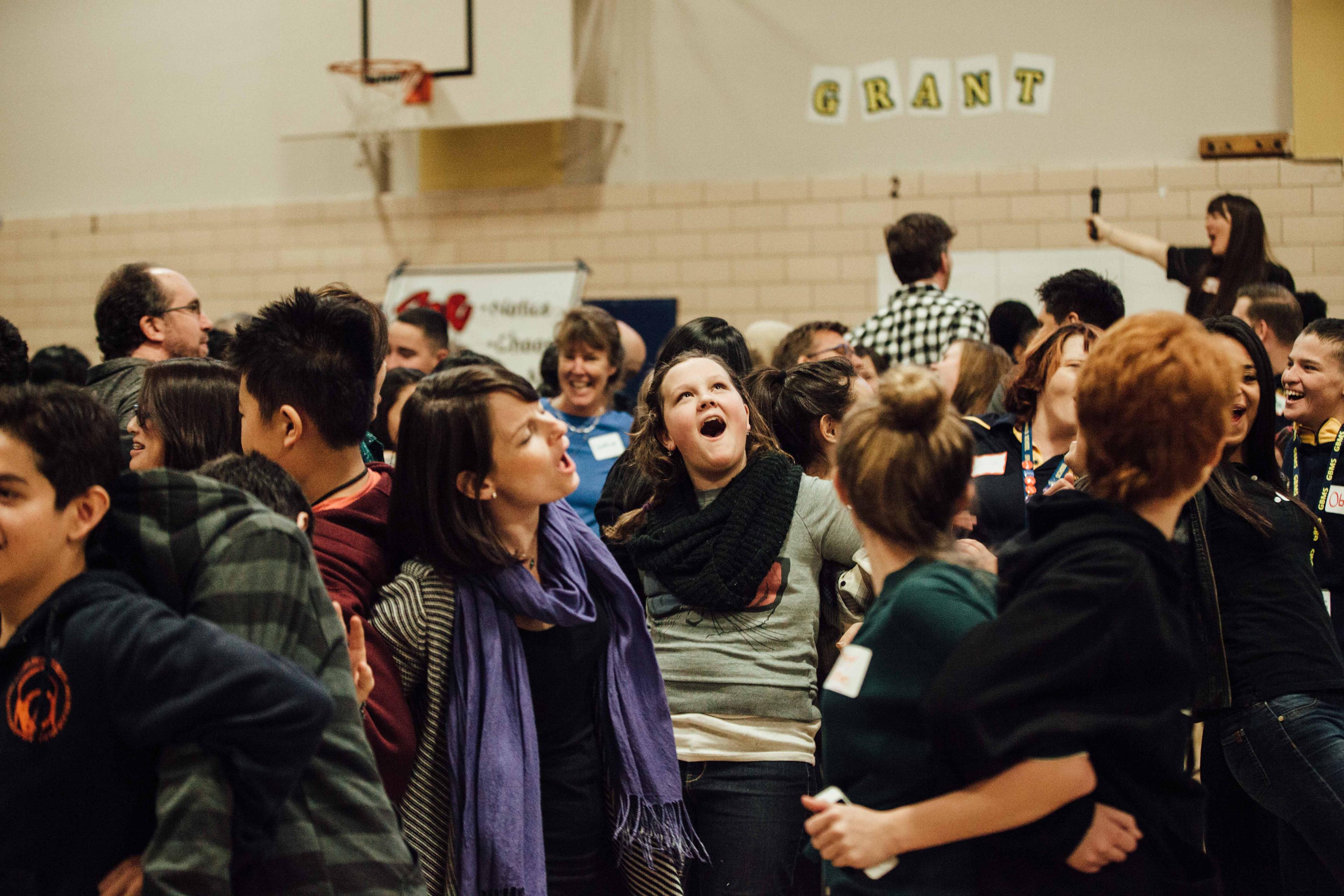
"What ends up happening is that for the first time, maybe in their entire lives, they’re actually breaking down the barriers, and the judgments that they formed, that separated them and actually seeing the person for who they are," he said. "And once they realize, the reason that person might have been mean [is] because look how much they’re going through in their lives.
"We really build a sense of empathy and compassion and the students tap into that and they actually start seeing each other as people," Poetry said.
Apologies
Poetry says something else happens -- again and again. And we watched it. The breakdown of those barriers leads to something magical. Kids spontaneously get up to the microphone and start apologizing to each other.
The first girl at the microphone was Cecilia, the eighth grader who didn’t know how to apologize.
I sat down with her a couple of days later and she used one word to describe how she feels now: "Relief."
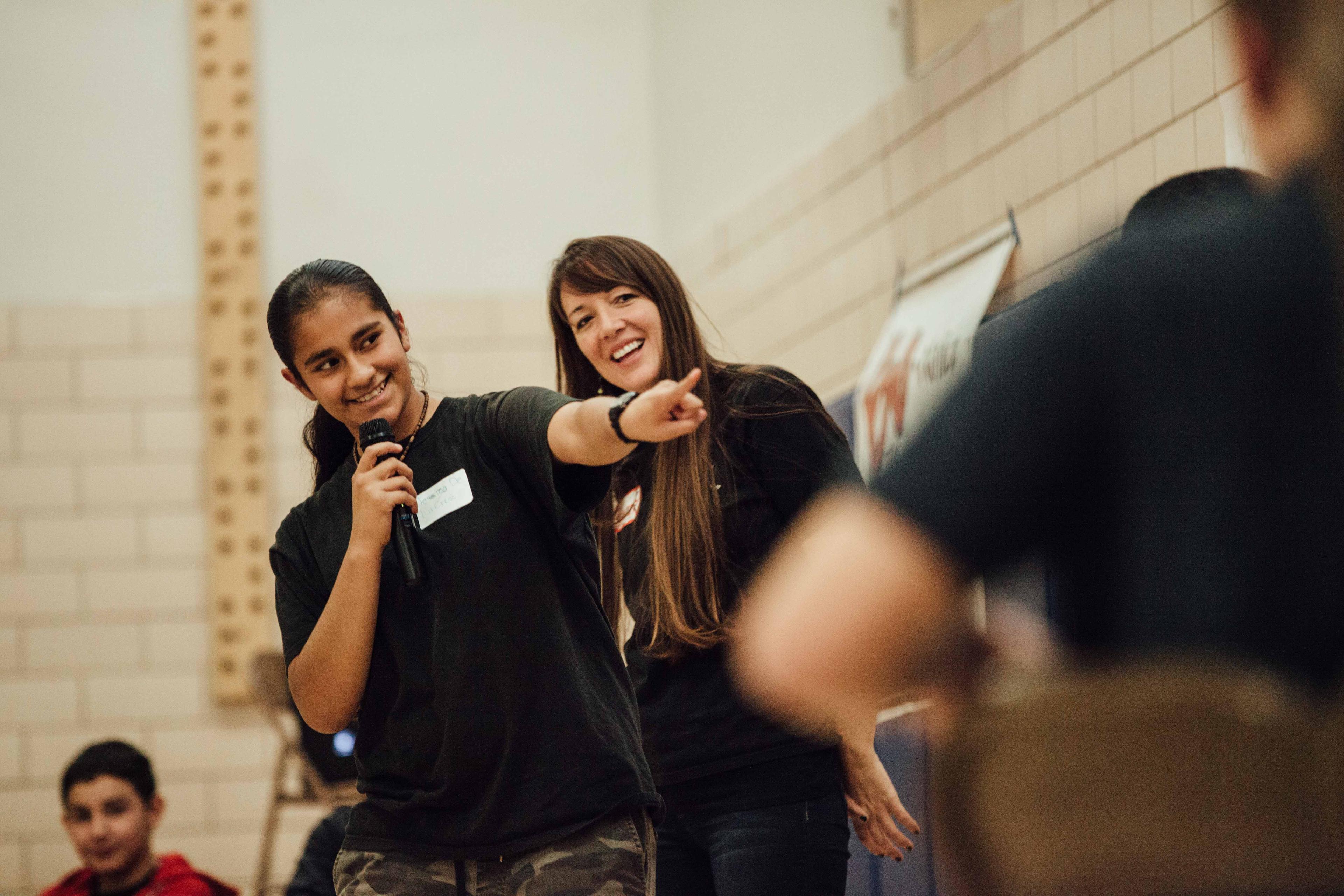
"It was pretty good to let myself open up, let people know who I am, what I’ve been going through and why I am the mean person I am," she siad.
Emily, the girl who went around hitting people, also stood up to give a heartfelt apology. But she told her classmates she didn’t know how to stop and asked for their help.
"I came up and got hugs from people," she said. "I didn’t even think they’d recognize me because they don’t -- I’m not very liked. And when they hugged me I was in tears because I just didn’t know what they went through, and they had the connection with me, it kind of made me happy inside because they kind of just held me and said, it’s OK, and it’s OK you’ll be fine."
And then came Sorayda, the girl who spent most of her life being bullied, and spent most of Challenge Day crying. For her the day changed her life at school.
"I’m not afraid to be judged anymore," she said.
But Sorayda says the experience also made her think deeply about her life at home. She realized how she’s been taking advantage of her mom, talking back to her. She’s trying to turn that around. And she says her mom’s noticed.
"Today when my mom brought me to school, I actually heard her say the three words I’ve wanted her to say for a long time," she said. "She said the words, ‘I love you.’ So I hugged her and gave her a kiss. It was a really impacting moment, because I haven’t heard those words in a long time."
Ripple Effects
Challenge Day can be intense. A lot of issues come up. After the session, adults met with school mental health workers to code the level of follow-up required for each student, if needed.
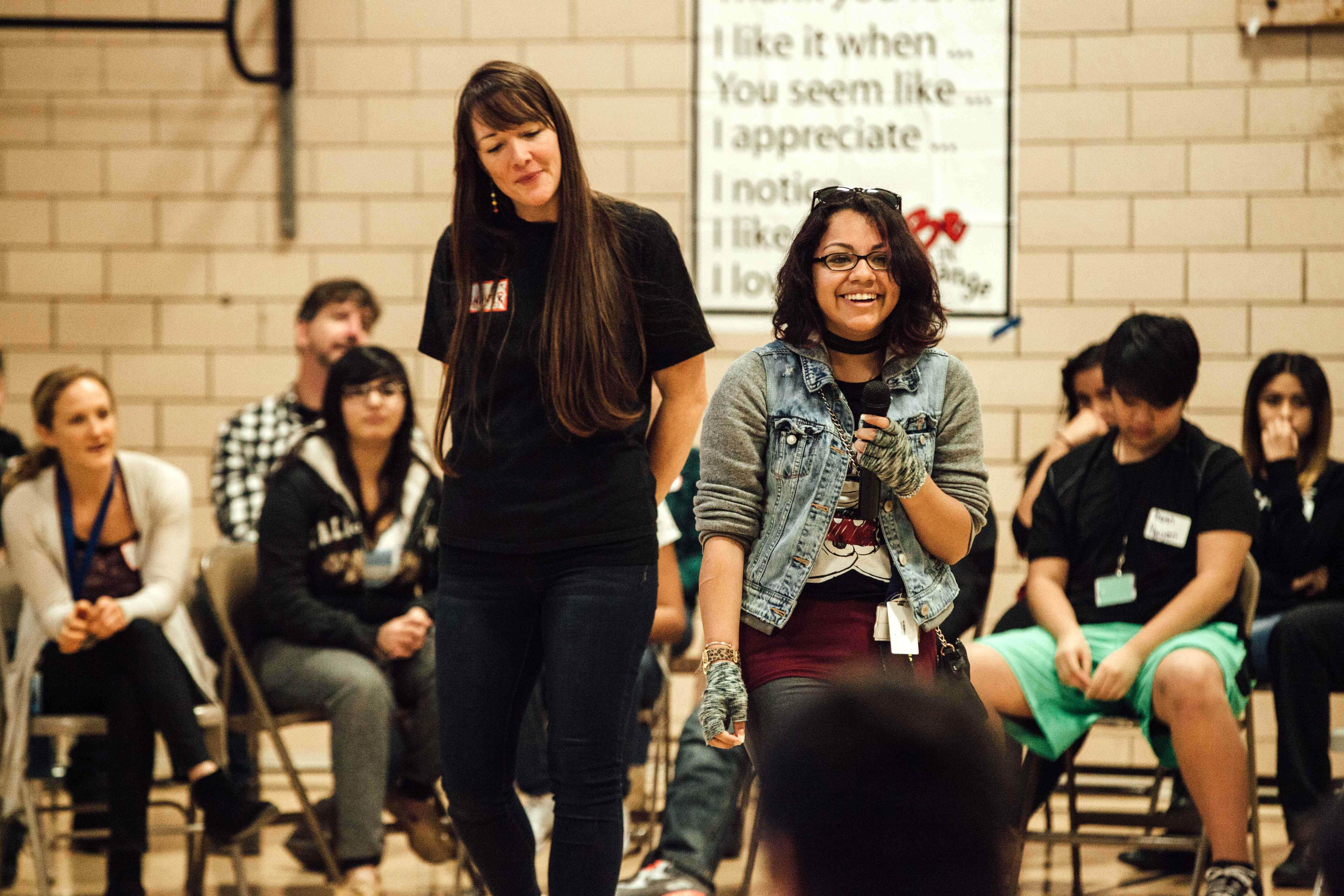
But a couple of days later, many kids said it felt better going back to school.
"I was little glad to be back and to say ‘hi’ to the people who are going through struggles and to give them hugs and just to know where they stand now and just to know the better side of them," Gabriel said.
Sorayda had seven behavior incidents since school started. She hasn’t had one since Challenge Day.
While the kids turn pages individually, the school also works hard at building a positive culture.
Along with an academic grade point average, it gives students a "character trait" GPA based on five factors: leadership, perseverance, kindness, integrity and curiosity. Every Friday in the auditorium, kids are honored for showing some of those traits.
Grant Beacon also partners with a local organization, Challenge Denver, that helps with five to six follow up programs to help kids learn healthy ways to cope with loss and pain in their lives, so they stop passing that pain on to others. The non-profit says the schools it has partnered with for a long time report data showing better attendance, better academic performance, and fewer behavioral issues.
Some of the Challenge Day participants participate in "Be the Change" groups to develop school activities based on what they’ve learned, to "continue the change for acceptance, love, tolerance, peace, building that healthy emotional community after the day," said Layne Palmer, executive director of Challenge Denver.
As a former school administrator and teacher, Palmer says she was "blindsided" by the huge social, emotional, and mental health needs of her students, which made it hard for them to focus on academics.
"It’s incredibly challenging for a student who is experiencing abuse, neglect, hunger, to say to them, ‘think about that later, right now we are reading a book,’ it’s just not going to be possible from a biological standpoint so we need to think how we can better equip and empower teachers and leaders," she said.
In January, teachers at Grant Beacon will get specialized training in how to work with children with trauma or behavior issues.
Even outsiders see the change at Grant Beacon.
Jennifer Wilson, who moderated the school’s recent Challenge Day, remembers moderating the first Challenge Day at Grant Beacon eight years ago.
"The kids were unruly, and they’re just yelling out and wouldn’t stop talking when we were talking and being really disrespectful to one another," she said. "They [eventually] got it and it was great then but it was just a totally different group. I can tell that this group feels really loved and I could tell this school has really loving boundaries with them."
Resources for parents, schools and students:
- Colorado School Safety Resource Center offers prevention and intervention material for schools and parents.
- Stopbullying.gov has general information about bullying, prevention tips and how to get help
- The Bully Project provides tips for parents, students and teachers
- Safe2Tell allows students to anonymously report any threatening behavior that endangers you, your friends, your family, or your community
- National Suicide Hotline: 1-800-273-TALK (8255)
- Second Wind Fund pays for counseling for at risk youth
- Sources of Strength builds resilience and positive youth connections
- Colorado Crisis Services gives Coloradans, including youth, access to mental health services 24/7 regardless of insurance









